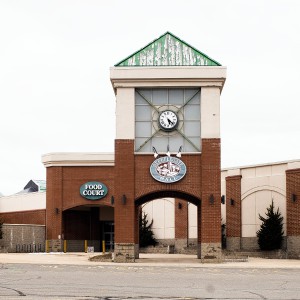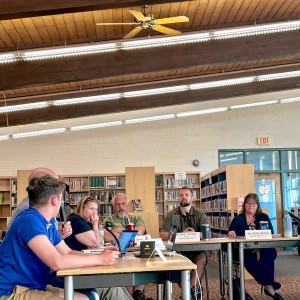Child advocate calls for end to out-of-state placement for youth following Tennessee visit
| Published: 08-20-2023 11:00 AM |
In a lime green jumpsuit, a child cleaned glass windows, mopped the floor and took the trash out from an area that served as the main entrance to the Bledsoe Youth Academy in Gallatin Tennessee.
It’s a youth residential placement program for boys located 1,100 miles away from the Granite State. But in July 2023, two New Hampshire kids were living in the facility, placed there by the state Division of Health and Human Services.
After touring the facility – where children have rug burns on their face from the use of prone restraints – Cassandra Sanchez, the New Hampshire child advocate has a few requests.
First, she called for the immediate return of the two children from the Bledsoe facility to one in New Hampshire. Second, she wants the state to discontinue placing children at that facility i n Tennessee. And third, she’d like to see a new plan from the Division of Health and Human Services to end out-of- state placements of New Hampshire children beyond the New England region.
Lying on the top tier of a bunk bed, a child staying at Bledsoe kicked a sprinkler head in his bedroom.
Now, half the building is under construction due to extensive water damage. The kid at fault was “on punishment for a month,” as a result.
With half the building closed off, long tables and benches serve as the cafeteria space and a classroom for six-hours a day.
While most residents sat at the tables, Sanchez noticed one child sitting on the carpet in the hallway. He’d be placed on restriction, he said, forced to eat alone on the dirty floor.
Article continues after...
Yesterday's Most Read Articles
 Neighboring landowner objection stalls Steeplegate redevelopment approval
Neighboring landowner objection stalls Steeplegate redevelopment approval
 How has Hopkinton, one of the smallest public schools in New Hampshire, become such a lacrosse powerhouse?
How has Hopkinton, one of the smallest public schools in New Hampshire, become such a lacrosse powerhouse?
 In Franklin, a Hometown Hero remains busy, 12 years after retiring from the U.S. Postal Service
In Franklin, a Hometown Hero remains busy, 12 years after retiring from the U.S. Postal Service
 Women at work on Warren: New combined salon, spa, DIY and retail space opens in former Peter’s Images location
Women at work on Warren: New combined salon, spa, DIY and retail space opens in former Peter’s Images location
 For some older Jewish professors at Dartmouth and UNH, opposition to campus arrests feels personal
For some older Jewish professors at Dartmouth and UNH, opposition to campus arrests feels personal
 New Hampshire Harm Reduction Coalition provides kits for safer drug use
New Hampshire Harm Reduction Coalition provides kits for safer drug use
“This, along with other instances to follow in this report, evidence a culture of shame, humiliation and inhumane punishment endemic to this program,” reads Sanchez’s report documenting her visit.
A typical day at the Bledsoe Youth Academy starts at 6 a.m. when child residents are woken up to make their bunk beds and clean their shared bedroom.
Straight through the day, until bedtime at 9 p.m. they are not allowed to return to the bedrooms.
“It is difficult to imagine being in a congregate living situation, one promoted for treatment, where there are no opportunities to privately take space or decompress during the day, furthering the impression of a non-therapeutic milieu, and a rather stressful living environment in general,” noted Sanchez.
Once a week residents have an individual therapy session. Daily, they participate in group sessions.
In one-on-one conversations with the two New Hampshire residents, they revealed to Sanchez, and Jennifer Jones, the assistant child advocate, that children at Bledsoe are often incentivized to assault other residents for reward.
In the report, the child advocate’s office gave the example that if one child was challenging staff members, another kid would be rewarded with snacks or other prizes for physically attacking him.
The children also outlined bringing back food from their restaurant job to appease staff members.
The outfits worn at the facility correlate with behavioral needs and punishment. The New Hampshire resident’s lime green jumpsuit means he’s “suffering disciplinary consequences.” Red jumpsuits signal dangerous and violent. Tan is considered to be a harm to themselves.
“These ‘uniforms’ are not only dehumanizing and institutional, but they also violate each kid’s privacy by broadcasting to the community their personal struggles,” the child advocates noted.
Staff often don’t hold back in publicly taunting kids with harsh reminders of trauma and family situations that may have led to their residential placement.
“They have heard staff say to other kids in the program, ‘you are here because your uncle raped you,’ and the kids reported being told, ‘you are here because your mamas don’t love you’,” the report reads.
In New Hampshire, the Sununu Youth Services Center, the state’s only youth detention center, is at a historically low capacity.
For the dozen of kids who are living there on average, a new focus on therapeutic interventions – meaning increased clinical treatments and therapy – is at the forefront of their time at the center.
Conversations continue to take place between state leaders and advocacy groups about the harm of youth incarceration.
In 2023, Governor Chris Sununu signed Senate Bill 49 into law which explicitly states that placing youth in settings “outside the state of New Hampshire undermines the stabilization and return to productive members of communities.”
The context of the bill focused on youth detention centers, not treatment facilities. However, the child advocates note that although Bledsoe Youth Academy reported to be a treatment facility to New Hampshire, it is used as a juvenile detention center, according to the Tennessee Department of Children’s Services.
By New Hampshire state law, residential treatment programs are required to provide positive support for children to further their education, physical, intellectual and emotional needs, and craft a treatment plans for the children in a structured, therapeutic environment.
After visiting Bledsoe, the Office of the Child Advocate determined that the facility not only fails to meet these standards, but also violates other tenants of state law, including a provision that prohibits children from living in a detention facility where construction restricts movement within the building. The advocates determined Bledsoe to be “physically restricted."
Anytime a restraint or seclusion is used with children in custody, it also must be reported to the Office of the Child Advocate within 48 hours. This requirement has not been met for the children in the care of Bledsoe.
As of July 1, there are 306 New Hampshire children in residential treatment programs. Of this group, 69 kids are placed outside the state.
After the visit to Bledsoe, the Office of the Child Advocate is calling for the termination of placing children in facilities outside of the New England region.
Sanchez’s office also recommended that the Division of Children, Youth and Families develop an assessment process for out-of-state placements that is completed each month, alongside an in-person visit from state staff.
The Bureau for Children’s Behavioral Health should also conduct quarterly in-person assessments of these facilities, including unannounced visits.
To conduct these visits, and ensure that all facilities are following New Hampshire’s certifications, Sanchez also recommends hiring a full-time position in the children’s behavioral health division.
“When leaving Bledsoe, the Advocates walked away with an overwhelming feeling of concern for all kids in this program,” the report reads. “If we are holding our own in state programs accountable to the standard of dignity and treatment for our most vulnerable children, then why would we continue to send them to a program far away that does not align with even our most basic expectations?”







 Granite Geek: Can you grow radishes on the moon? NHTI students tried
Granite Geek: Can you grow radishes on the moon? NHTI students tried Adam Montgomery sentenced to minimum 56 years on murder charges in young daughter’s death
Adam Montgomery sentenced to minimum 56 years on murder charges in young daughter’s death Following budget cut, Pembroke revisits future of elementary school re-build
Following budget cut, Pembroke revisits future of elementary school re-build
